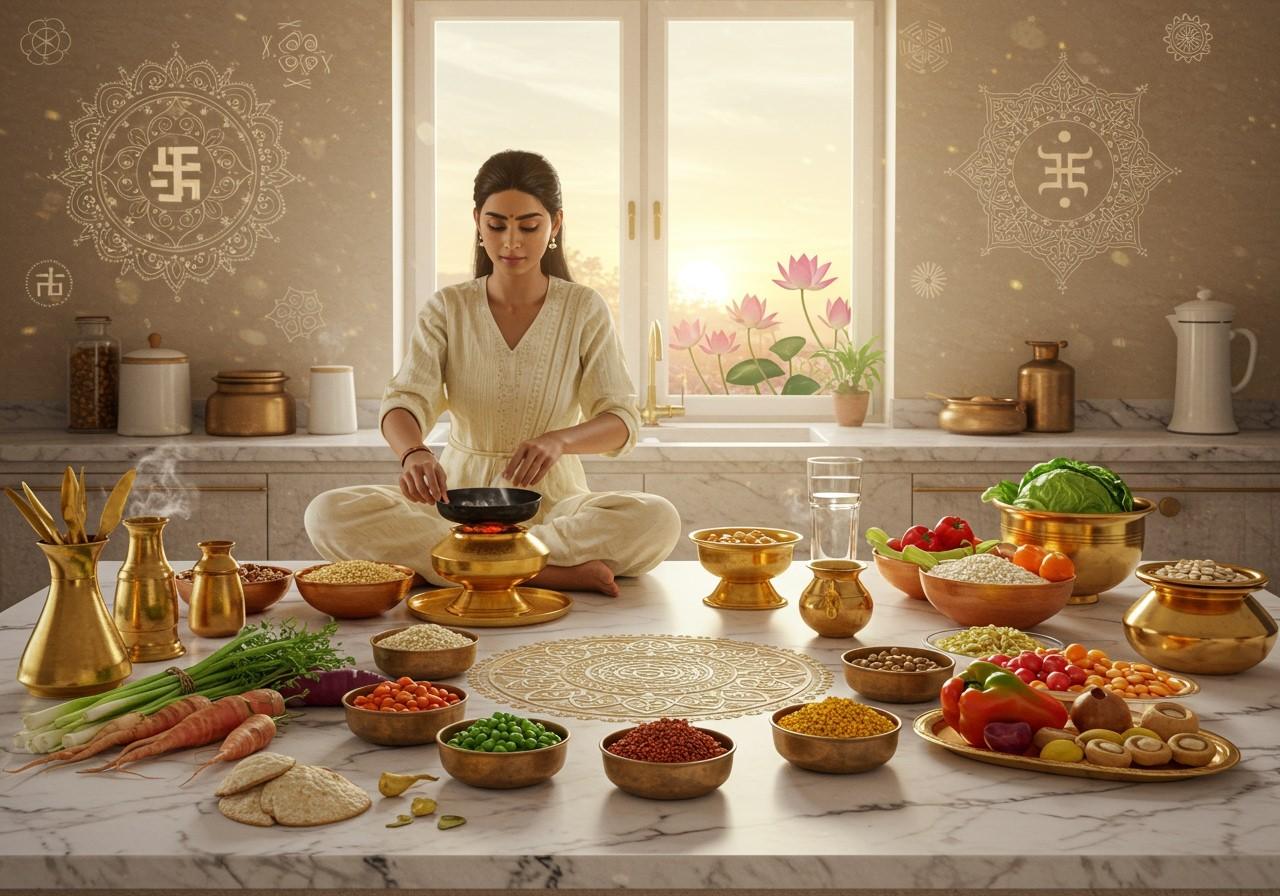
In Jainism, a religion originating in ancient India, food transcends mere sustenance; it embodies profound ethical and spiritual values. Jain dietary practices prioritize non-violence (ahimsa), shaping their food choices. This guide delves into Jain dietary traditions and lifestyle in 2025, offering insights into these practices while respecting tradition and embracing modern conveniences like online shopping.
Jain Dietary Principles
Jain dietary practices center on minimizing harm to all living beings. This involves abstaining from root vegetables like potatoes, onions, and garlic to avoid killing the entire plant. Eating after sunset is discouraged to prevent accidental consumption of insects. ‘Satvic’ foods, which are fresh, light, and promote mental clarity, are favored. Fasting and dietary restrictions are common during festivals, such as the ‘Ekadasi’ fast, which involves abstaining from grains. These practices are rooted in spiritual and ethical beliefs, extending beyond mere dietary preferences. Many Jains adapt these traditions to modern life through innovative plant-based options.
Foods Jains Avoid
Certain foods are traditionally excluded from Jain diets due to ethical and spiritual considerations.
- Mushrooms and fungi: Not consumed as they may harbor microorganisms and grow in unclean environments.
- Honey: Avoided as its collection exploits bees.
- Fermented foods: Excluded due to the presence of microorganisms.
- Eggs, meat, and fish: Strictly prohibited due to the principle of non-violence.
- Onions and garlic: Believed to heighten passions and are avoided for spiritual purity. These restrictions align with Jainism’s core values of non-violence and compassion.
Foods Jains Consume
Jain diets emphasize:
- Fresh produce: Fruits, vegetables, grains, and legumes form the foundation of the diet. Organic and locally sourced options are preferred.
- Dairy (with conditions): Consumed as long as the sourcing doesn’t harm animals.
- Non-root spices and herbs: Used to enhance the flavor of Jain cuisine.
- Plant-based alternatives: Tofu, almond milk, and other substitutes align with Jain principles.
Popular Jain dishes include dal, rice, and various vegetable preparations (sabzi), reflecting a culinary approach that promotes a healthy lifestyle.
Cultural and Spiritual Significance
Jain dietary practices are integral to their spiritual and cultural identity.
- Rituals and festivals: Food plays a significant role in ceremonies and celebrations, serving as offerings and symbols of devotion.
- Community bonds: Shared dietary practices foster a sense of community and preserve cultural heritage.
- Anekantavada: The Jain principle of multiple truths allows for flexibility in dietary interpretation.
- Intergenerational transmission: Elders play a vital role in educating younger generations about these traditions.
These practices reinforce Jain ethical principles and spiritual aspirations in everyday life.
Modern Challenges and Adaptations
Maintaining traditional Jain dietary practices in the modern world presents certain challenges.
- Urban living and sourcing: Accessing authentic ingredients can be difficult in urban environments.
- Globalization and evolving habits: Global food trends can influence dietary choices, necessitating adaptations.
- Technology as a bridge: Online platforms provide access to Jain-friendly products globally, helping preserve traditions.
- Niche markets and services: Jain-friendly restaurants and catering services cater to specific dietary needs.
Younger generations strive to balance traditional practices with modern lifestyles, while environmental sustainability aligns with Jain principles of minimizing harm.
How Poojn.in Supports Your Jain Dietary Practices
Poojn.in offers a variety of products catering specifically to Jain dietary needs. You can find a wide range of pure vegetarian ingredients, free from root vegetables and adhering to Jain food preparation standards. Poojn.in also offers authentic ritual items for Jain ceremonies.
Here’s how Poojn.in simplifies your Jain shopping experience:
- Pure vegetarian ingredients: Sourced and handled according to Jain principles of ahimsa.
- Root vegetable-free products: Ensuring compliance with Jain dietary restrictions.
- Authenticity and quality: Poojn.in maintains high standards in product selection and preparation.
- Online convenience: Shop from the comfort of your home with detailed product information and secure delivery.
- Dedicated support: Contact the customer support team for any questions regarding ingredients or preparation methods.
Explore Jain-appropriate products like Green Mung Dal, Supari (Areca Nut), and Large Size Elaichi (Black Cardamom) at www.poojn.in or contact [email protected] for specific inquiries. Poojn.in provides other essential ingredients for Jain cooking, including Pancha Sasya (Five Grains). You can also find camphor dust, ghee, and gulab jal for your pooja needs.
Embracing Tradition with Modern Convenience
In 2025, Jain dietary practices continue to uphold the enduring values of compassion and non-violence. These principles guide Jains in their food choices, reflecting a deep reverence for all life. While maintaining these traditions in a fast-paced world can be challenging, modern technology offers valuable solutions. Online shopping platforms facilitate access to authentic Jain foods and ingredients, bridging the gap between tradition and convenience.
As Jains navigate these practices, they preserve their cultural and spiritual heritage for future generations. By harmonizing tradition with contemporary living, Jains maintain a vibrant and meaningful connection to their rich heritage in today’s world.
FAQs on Jain Dietary Practices
Can Jains eat mushrooms? No, mushrooms are avoided due to their growth in unclean environments and potential to harbor microorganisms, conflicting with ahimsa.
Can Jains eat potatoes? Potatoes, along with other root vegetables, are generally avoided as their harvest can harm subterranean life.
What do Jains eat? Jains consume a variety of above-ground grown grains, lentils, fruits, and vegetables, prioritizing foods that minimize harm to all beings.
What do Jains not eat? Jains abstain from root vegetables, certain fruits with many seeds, fermented products, meat, eggs, and honey.
Why don’t Jains eat onion? Onions, being root vegetables, are avoided as their harvest can harm organisms in the soil, violating the principle of non-violence.
Can Jains eat fermented foods? Fermented foods are generally avoided due to the microbial activity involved, which contradicts the Jain commitment to non-violence towards all life forms.
Are dairy products allowed in Jain food? Dairy is permissible as long as it is produced without harming animals.


